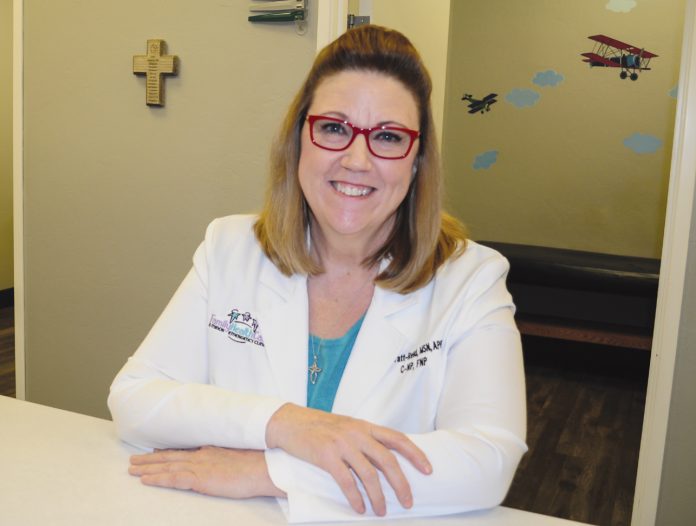story and photo by Bobby Anderson, Staff Writer
Oklahoma’s advanced practice nurses are once again seeking full practice authority, backing proposed legislation that would remove financial and logistical hurdles to them providing care to Oklahomans who need it the most.
House Bill 1013, by Rep. Josh Cockroft (R-Wanette) and Senate author A.J. Griffin (R-Guthrie), would grant Oklahoma nurse practitioners (NPs) the freedom to practice to the full extent of their education and training, enabling them to serve Oklahomans where care is most needed.
This is especially important in rural areas of the state that are medically underserved.
Toni Pratt-Reid, APRN, is president-elected of the Association of Oklahoma Nurse Practitioners.
“We’re fighting for full practice authority, which is a movement that’s happened across the United States,” Pratt-Reid said, noting it’s the group’s second year to rally behind the cause.
Currently, advanced practice nurses in Oklahoma have full practice authority when it comes to diagnosis and treatment options but not full prescription authority.
A regulatory rule is in place that requires a supervising physician be available as needed for consultation.
“In a sense it’s an outdated rule and many states have recognized we are capable of practicing independently,” Pratt-Reid said. “When I say independently we’re not on an island. If we have a broken bone we’re going to call an orthopedist. We’re not going to call our collaborating (physicians) because they’re not an orthopedist. If we have a diabetic that we’re needing some consultation we’re going to call an endocrinologist. We have our own network of providers we use, talk with and collaborate with.”
The current system of securing a collaborating physicians has become one that physicians have a vested financial interest in maintaining.
“The ability to find a physician who will collaborate with us has become a high pricetag – upwards to as much as $75,000 per year,” Pratt-Reid said.
Earlier this year AARP Oklahoma announced its support of the bill.
“Oklahomans already face a shortage of primary care providers and that problem will only become more acute as our population ages,” said Sean Voskuhl, state director of AARP Oklahoma. “The shortage means some Oklahomans are driving long distances and waiting days for appointments for primary care, not to mention a lack of consumer choice. Delays in care not only hurt the consumers, but place added stress on family caregivers, who are all too often overwhelmed with bearing the brunt of providing and overseeing the care of a loved one.”
A January 2016 SoonerPoll surveyed 410 likely voters asking, “Do you support or oppose allowing nurse practitioners, who have advanced training, to serve as the primary or acute care provider of record for a patient?” In response, 86.7% said they support allowing a nurse practitioner to operate with full practice authority.
According to the American Association of Nurse Practitioners, more than one third of the nation has adopted full practice authority licensure and practice laws for nurse practitioners.
The 2010 landmark report from the Committee on the Robert Wood Johnson Foundation Initiative on the Future of Nursing report addressed the issue head-on.
“Nurses have great potential to lead innovative strategies to improve the health care system,” the IOM report stated. “However, a variety of historical, regulatory, and policy barriers have limited nurses’ ability to generate widespread transformation.
“Many of these barriers have developed as a result of structural flaws in the U.S. health care system; others reflect limitations in the present work environment or the capacity and demographic makeup of the nursing workforce itself. Regulatory barriers are particularly problematic.”
The report made the following recommendations to Congress:
* Expand the Medicare program to include coverage of advanced practice registered nurse services that are within the scope of practice under applicable state law, just as physician services are now covered.
* Amend the Medicare program to authorize advanced practice registered nurses to perform admission assessments, as well as certification of patients for home health care services and for admission to hospice and skilled nursing facilities.
* Extend the increase in Medicaid reimbursement rates for primary care physicians included in the ACA to advanced practice registered nurses providing similar primary care services.
* Limit federal funding for nursing education programs to only those programs in states that have adopted the National Council of State Boards of Nursing Model Nursing Practice Act and Model Nursing Administrative Rules (Article XVIII, Chapter 18).
“In many cases, there is no actual collaboration with the physician,” said Cockroft. “This makes the requirement meaningless and only slows Oklahomans’ – particularly those in rural areas – access to valid health care services. It already is hard for those in rural areas to find adequate services, and frankly this rule hampers economic development in our rural communities.”













